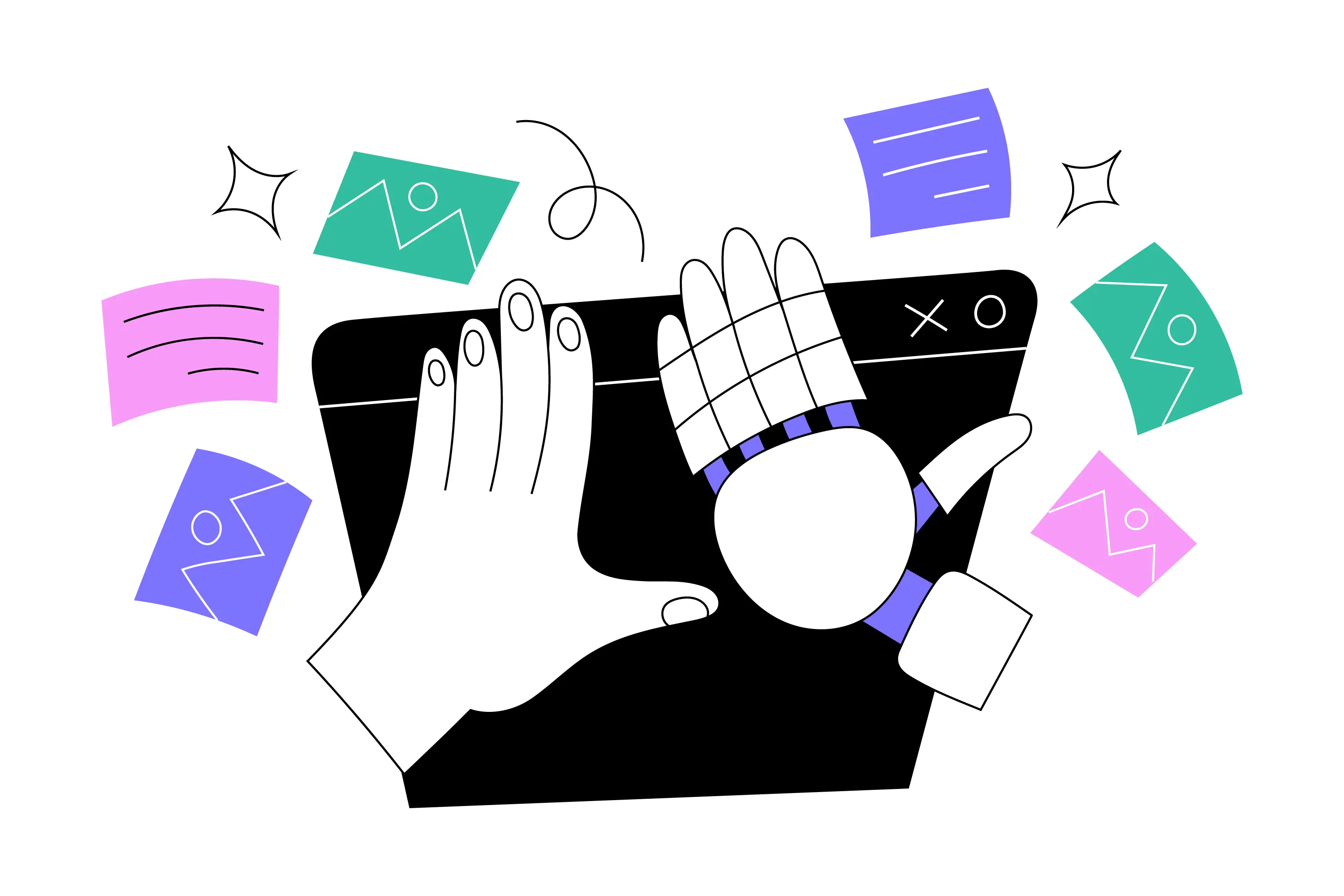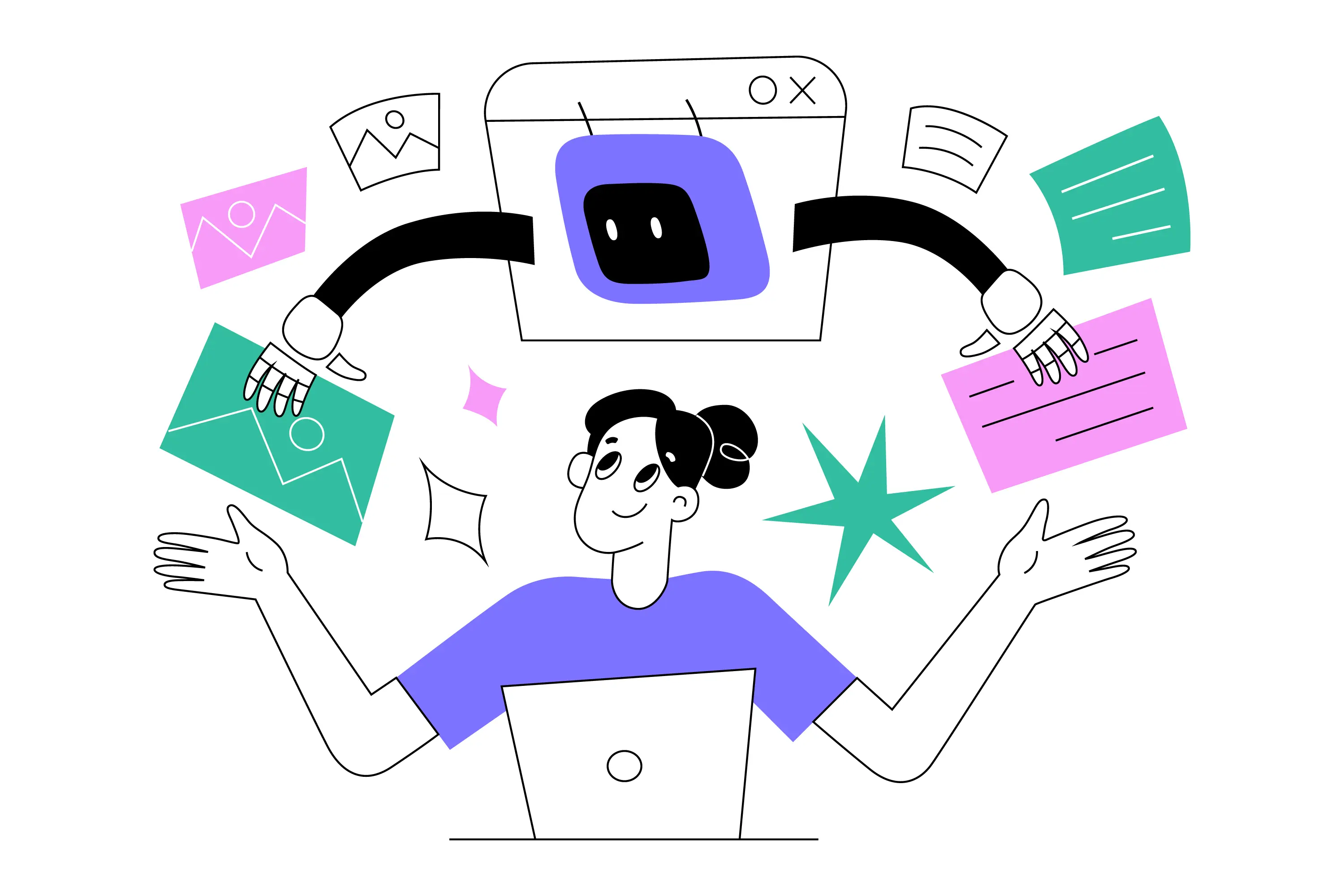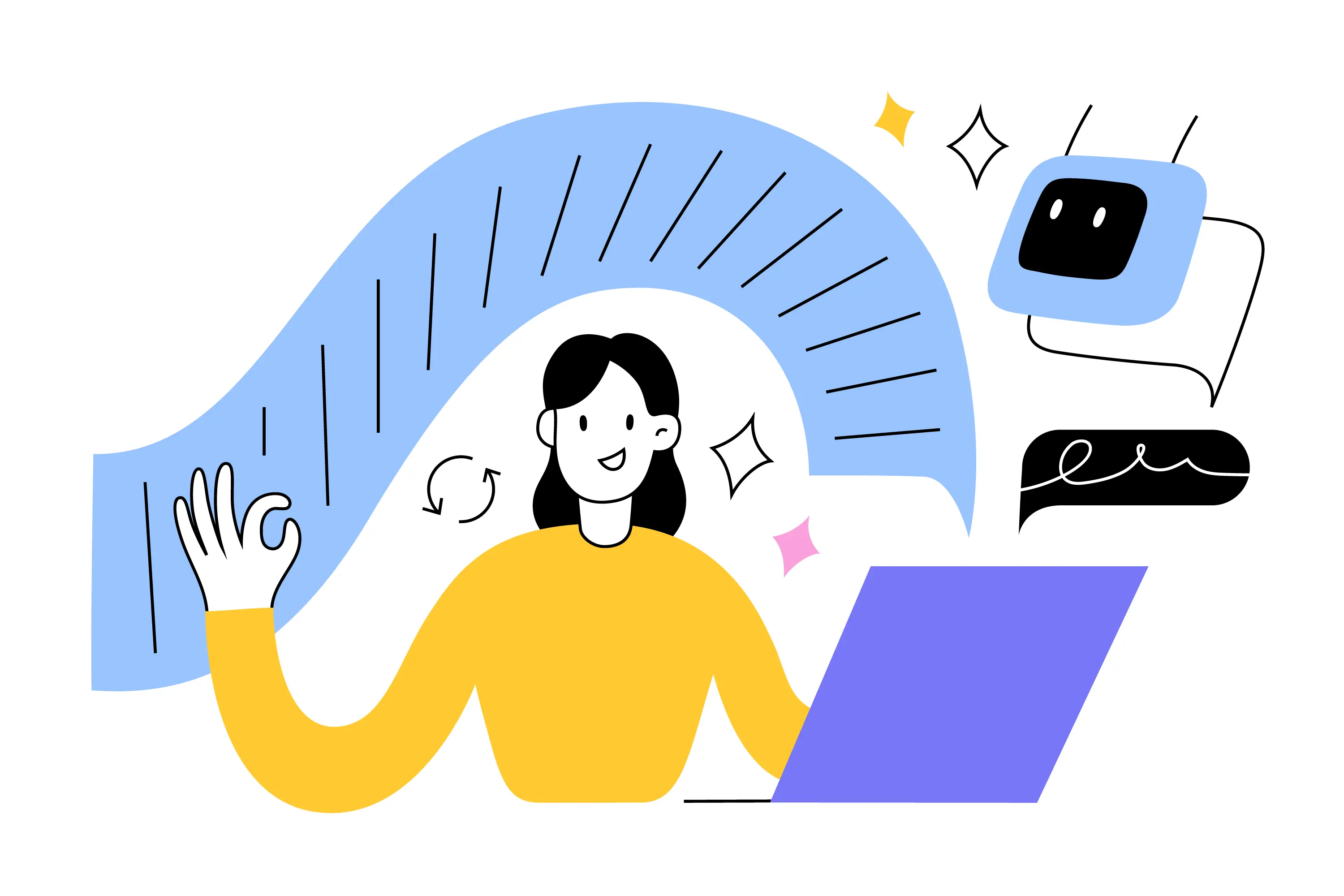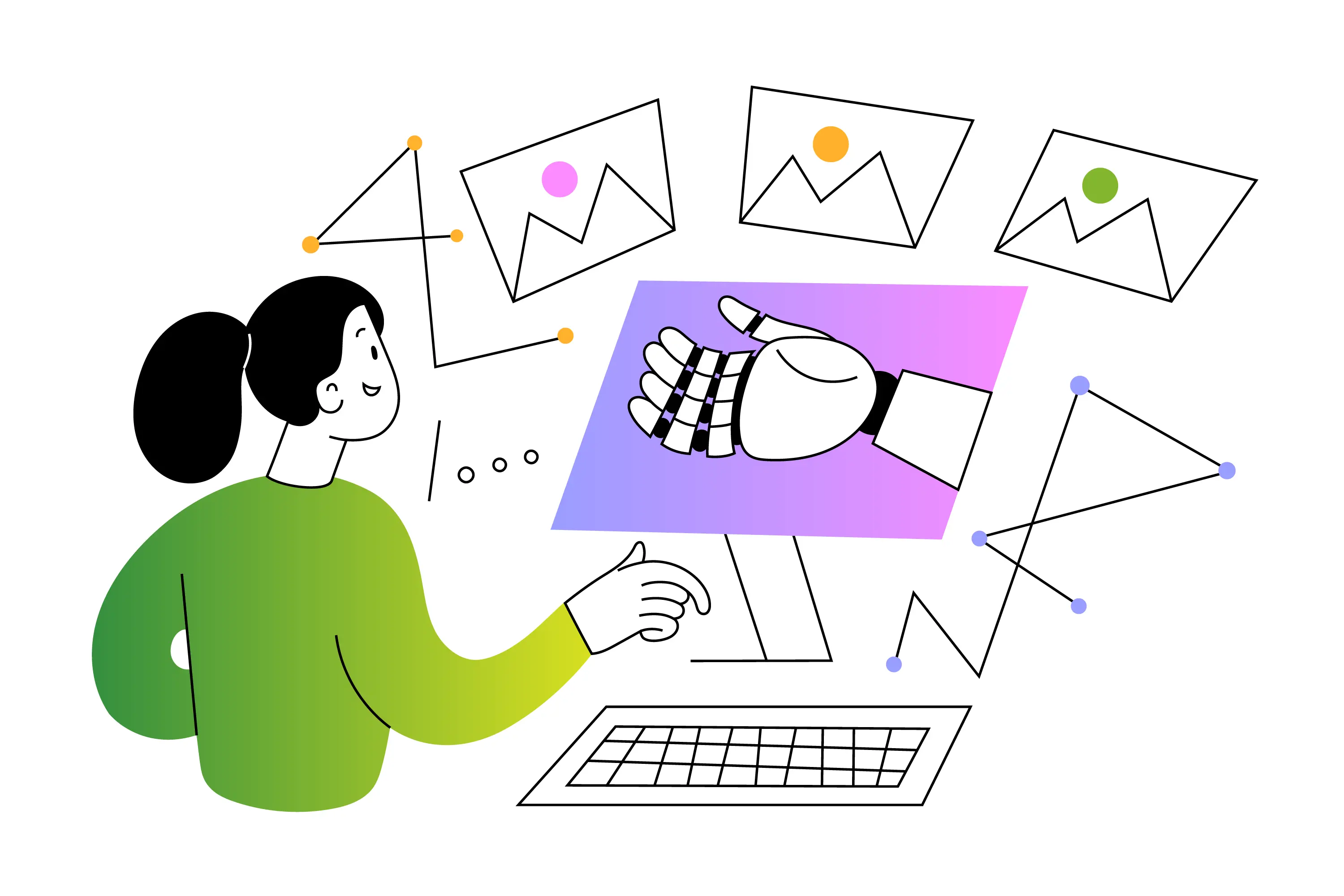
2023 has been an extremely exciting year for AI. As someone who has been working on machine learning, and specifically language understanding, for almost 10 years, I can't describe my amazement at what large language models can do today. But as AI tools become more powerful, and embed themselves into our daily workflows, what does that mean for the humans? How should we think about improving ourselves, and what specific areas and skills should we work on for success? Let's explore!
I think, many years from now, we will look back to this year, to the year of 2023, as an important watershed moment.
It's been truly exhilarating to see all the AI tools reaching awe-inducing performance. From text generation, to image creation, to knowledge synthesis, AI-powered tools have quickly become an integral part of many of our daily workflows.

Above: 2023, what a year. Yes indeed it is October now, but I made this when GPT-4 came out. And it's continued to be quite a year. I have never had this much fun reading software feature releases in the year of 2023 compared to any other year.
There are many ongoing discussions about the impact of AI, and the role of humans vs machines. Many important conversations are being had on the potential of the technology, the ethics of its use, and even what it means to be human. This post has a humbler goal. Now that AI tools have become so powerful, how should we, the humans, adapt? How should we cultivate ourselves to thrive in this new era of AI? What is the most important skill we should acquire to live a happy and productive life?
The Skill Economy
Most modern economies, such as that of the United States, the UK, and many other countries, are often described as "skill economies". We value and reward specialized skills, particularly in industry sectors like technology, finance, engineering, healthcare, and more.
Think about your most recent resume. What sections must be included? Education, work experience, and, most importantly, skills, which you might diligently update to match what employers are looking for. In fact, education and work experiences both serve as additional signals for skills.
That's why many of us willingly invest in years of education, and even extra training and certifications long after graduation. We constantly seek out new knowledge, and add to our skillset.
We have been living in such a skill economy for decades. Like fish in water, we are so used to it that whenever we think about adapting to the future, we think, "what skills do I need?"
In the era of AI, this is all changing, and changing fast.
AI, the Skill Leveler
In a joint paper authored by researchers from Harvard, MIT, University of Pennsylvania, and the Boston Consulting Group, a series of carefully designed experiments were carried out to see how AI tools affect the performance of human workers. The experiment participants were consultants working on realistic assignments, with tasks ranging from creative to analytical.
This seminal work reported an eye-opening observation:
We also found something else interesting, an effect that is increasingly apparent in other studies of AI: it works as a skill leveler.
The consultants who scored the worst when we assessed them at the start of the experiment had the biggest jump in their performance, 43%, when they got to use AI. The top consultants still got a boost, but less of one.
-- Centaurs and Cyborgs on the Jagged Frontier
Let it sink in a little bit. "AI works as a skill leveler." AI made the worst performers work as well as the best performers.
The skills we spend years and years to hone, sometimes even at great costs on books, courses, and trainings, are now being delivered near instantly by AI tools.
If that feels like a bit of a bummer, think of it from a different perspective. That dream or that passion project you've been too intimidated to start, because you fear you don't have the skills? Well, now you can. Skill is no longer a barrier to acutalizing productivity. In this lens, the creative opportunities are as endless as they are exciting.

Above: AI is emerging as a "skill leveler". Its versatility and performance is helping users to be more productive and create higher quality works.
Skill vs Meta-Skill
As AI begins leveling the field in many skill-based tasks, it's clear that the differentiator going forward won't be the skills themselves. Rather, we need to elevate and think about "meta-skills": higher-order skills that describe our ability to learn and leverage new tools.
This is analogous to the transformation of "knowledge". Not too long ago, merely decades prior, knowledge was a scarce resource. It was a privilege to have access, and careers were built by internalizing a vast amount of specialized knowledge. But, as we celebrate Google's 25th birthday this year, we know that hasn't been the case for a while. It's no longer about how much knowledge you have memorized, but rather how well you can find and apply it on demand. The competitive advantage is no longer in the knowledge itself, but rather, your "Google-fu".
The skill transformation is following a very simliar trajectory. We are already seeing differences in people's ability to make use of AI tools. Knowing how to ask the right questions, or, "prompt engineering", is a skill that is becoming increasingly important. Moreover, there are tasks AI tools are surprsingly ill-equipped to handle. Knowing when to use AI, and when to trust your own intuition and intelligence, is a meta-skill that will pay dividends.
To put it simply, in the era of AI, it's less about "raw" skills, and more about:
- The skill to quickly pick up new skills, often with the help of AI tools.
- The skill to quickly pick up new tools, often driven by AI, and know their strengths and limitations.

Above: Developing the skill to develop skills quickly with the help of AI. If that sounds recursive, that's because it's a "meta skill".
Skill vs Will
But, even when equipped with meta skills, it's still not enough.
As the old saying goes, you can bring a horse to the water, but you can't make it drink. As "skill" is becoming more accessible, and no longer the primary blocker to success, the focus is shifting to "will": the motivation, resilience, and discipline to actually get things done.
But how do we cultivate "will"? Compared to the "skill market", what is the "will market"? When we need to learn new skills, we know to look for courses. When we need to hire skilled workers, we know to look for resumes. But when we need to "increase our willpower", what do we do?
It might not be clear at this moment, but over time, the "will market" will emerge. This is because the importance of willpower is only going to increase, and tools that help people stay focused and motivated (like HeroMode!) will as a result become indispensable. Through this evolution, we will also gain more scientific understanding on the nature of motivation.

Above: AI can help us write, but it can't replace our own willpower to persevere through long-term goals like publishing a book. As AI makes "skills" readily available, it's the "wills" that will set us apart.
Skilled Worker vs Manager
When our mobile phones became also a powerful camera, many of us became amateur photographers.
When AI tools became such effective skilled workers, many of us will become Project Managers.
That's because our roles are elevating. With help from AI, we no longer need to be the skilled workers for those tasks that AI can do. Instead, we become their managers. We start to think more strategically: identify the right tasks given a goal, assign the tasks to the right AI tools, and continuously monitor the output. We no longer play the violin. In the era of AI, we are each the conductor of the symphony.
This means that we need to adopt the mindset of a manager to thrive alongside AI tools. And what does a good manager do?
- Given a goal, a good manager can break it down into actionable tasks.
- Given a task, a good manager can identify who is best suited to complete it.
- Given the output of a task, a good manager can evaluate its quality and provide feedback.
- When unexpected challenges arise, a good manager can quickly adapt and re-prioritize.

Above: In the era of AI, it's less about being a skilled worker, but rather about being an effective manager who orchestrates many skilled AI tools.
TL;DR Bullet Points
AI is emerging as a "skill leveler". Its versatility and performance is helping users close the skill gap.
That means in the era of AI, it's less about "raw" skills.
Rather, "meta skills" are becoming more important: the ability to quickly pick up new skills, assisted by new tools powered by AI.
Simlarly, if skill is accessible to everyone, then the differentiator will shift towards "will": the motivation, resilience, and discipline to actually get things done.
Lastly, being an effective "Manager" of AI tools is becoming more important than being a skilled worker.
